 Today we celebrate the Feast of Saint Andrew, Apostle of our Lord Jesus Christ. Most New Testament references include him on a list of the Twelve Apostles or group him with his brother, Simon Peter. But we see him acting as an individual three times. When a number of Greeks (or Greek-speaking Jews) wished to speak with Jesus, they approached Philip, who told Andrew, and the two of them told Jesus (John 12:20-22). Since "Philip" and "Andrew" are Greek names, these petitioners may have sought them out. Before Jesus fed the Five Thousand, Andrew said, "There is a boy here who has five barley loaves and two fish, but what are they for so many? (John 6:9)"
Today we celebrate the Feast of Saint Andrew, Apostle of our Lord Jesus Christ. Most New Testament references include him on a list of the Twelve Apostles or group him with his brother, Simon Peter. But we see him acting as an individual three times. When a number of Greeks (or Greek-speaking Jews) wished to speak with Jesus, they approached Philip, who told Andrew, and the two of them told Jesus (John 12:20-22). Since "Philip" and "Andrew" are Greek names, these petitioners may have sought them out. Before Jesus fed the Five Thousand, Andrew said, "There is a boy here who has five barley loaves and two fish, but what are they for so many? (John 6:9)"The first two disciples whom John reports as attaching themselves to Jesus (John 1:35-42) are Andrew and another disciple (unnamed, but commonly supposed to be John himself — John never mentioned himself by name, a widespread literary convention). After meeting Jesus, Andrew found his brother Simon and brought him to Jesus. Thus, on each occasion when he is mentioned as an individual, we see him bringing others to meet the Savior.
Just as Andrew was the first of the Apostles, so the Western Church uses his feast to mark the beginning of the Church Year. The First Sunday of Advent is defined as the Sunday on or nearest his feast. (The way the reckoning was designed, it also means that there are always four Sundays in Advent, including, as in this year, the 24th of December, the Eve of the Nativity.
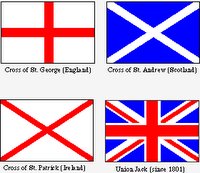 Scotland considers Andrew to be its national saint. Meanwhile, George (23 April), Patrick (17 March), and Dewi (1 March) fill these roles for England, Ireland, and Wales, respectively. George, a soldier, is customarily pictured as a knight with a shield that bears a red cross on a white background. This became the national flag of England.
Scotland considers Andrew to be its national saint. Meanwhile, George (23 April), Patrick (17 March), and Dewi (1 March) fill these roles for England, Ireland, and Wales, respectively. George, a soldier, is customarily pictured as a knight with a shield that bears a red cross on a white background. This became the national flag of England.Tradition says that Andrew was crucified on a Cross Saltire — an "X"-shaped cross, which became his symbol and later, the national flag of Scotland. One symbol of Patrick is a red cross saltire on a white background. The crosses of George and Andrew were combined to form the Union Jack, or flag of Great Britain; later the cross of Patrick was added to create the present Union Jack.
Alas, poor Wales ... it doesn't appear on the British flag, perhaps because Dewi didn't have such a representative symbol.
Lection
Psalm 139:1-20 or Psalm 19:1-6
Deuteronomy 30:11-14 or Ezekiel 3:16-21
Romans 10:(8-9)10-18
Matthew 4:18-22 or John 1:35-42
Collect
Almighty God, by Your grace the blessed apostle Saint Andrew obeyed the call of Your Son to be His disciple. Grant us also to follow the same Lord Jesus Christ in heart and life, who lives and reigns with You and the Holy Spirit, one God, now and forever.
Technorati Tags: Saint Andrew | St. Andrew | Andrew | Saint Peter | Saint Philip | Jesus | Jesus Christ | Christ | Church Year | liturgical calendar | sanctorial calendar | Christianity | Christian | Lutheran | Lutheranism | Christian feasts | festivals | saints' days | biography | hagiography | commemoration | theology | historical theology | exegetical theology | history | Church history | Christian history | Bible history | biblical history | Bible | Scripture | Gospel | New Testament
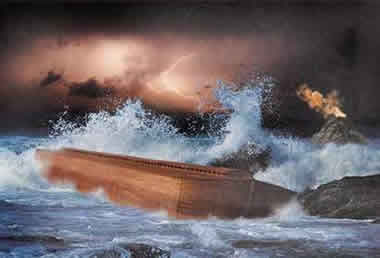 The world had become extremely corrupt, so God instructed Noah, the son of Lamech (Genesis 5:30) to build an ark to provide security for his family and selected living creatures from the waters of a devastating flood that God warned was coming (Genesis 6). Noah built the ark, and the flood came soon after its completion (Genesis 7). The entire earth was flooded, blotting out "every living thing that was on the face of the ground, man and animals and creeping things and birds of the heavens. (7:23)"
The world had become extremely corrupt, so God instructed Noah, the son of Lamech (Genesis 5:30) to build an ark to provide security for his family and selected living creatures from the waters of a devastating flood that God warned was coming (Genesis 6). Noah built the ark, and the flood came soon after its completion (Genesis 7). The entire earth was flooded, blotting out "every living thing that was on the face of the ground, man and animals and creeping things and birds of the heavens. (7:23)"After the flood subsided, the ark rested on the mountains of Ararat. When Noah determined it was safe, and God confirmed it, he and his family and all the animals disembarked (Genesis 8). Then Noah built an altar and offered a sacrifice to God for having saved his family from destruction. God declared a rainbow to be sign of His promise that never again would a similar flood destroy the entire earth (8:20).
We remember and honor Noah for his faithful obedience, as he believed that God would do what He said He would. Jesus (Matthew 24:36-39; Luke 17:22-27), Saint Peter (1 Peter 3:18-22; 2 Peter 2:4-10), and the author of Hebrews (11:7) all used Noah and the Flood as illustrations. These include God's judgment on sin, unwavering faith, a picture of Holy Baptism, and a prefiguring of Christ's suffering, death, descent into hell, and resurrection. Luke also listed Noah in Jesus' genealogy (3:36).
Lection
Psalm 29
Genesis 7:1-5, 11-12, 17-23
1 Peter 3:18-22 or Hebrews 11:1-3, 7; 12:1-2
Matthew 24:36-44
Collect
Lord God, heavenly Father, You kept Noah righteous in the midst of a sinful world and, through him, delivered life from the Flood's destruction, continuing also the human line of Your Son, our Lord Jesus Christ and foreshadowing the destruction of sin in Baptism and the preservation of new and eternal life in the Ark of the Holy Christian Church. Grant that we, the heirs of Noah by birth would likewise be heirs in faith of all Your promises, for the sake of our Lord and Savior Jesus Christ, who lives and reigns with You and the Holy Spirit, one God, now and forever. Amen.
Technorati Tags: Noah | prophet | faith | flood | The Flood | rain | forty days and forty nights | 40 days and 40 nights | ark | Noah's Ark | Genesis | young earth | Scripture | Bible | God's Word | Old Testament | Church Year | liturgical calendar | Christianity | Christian | Lutheran | Lutheranism | confessional Lutheran | Christian feasts | biography | hagiography | saint | saints' days | commemorations | lectionary | faith | theology | Christology | baptism | Holy Baptism | resurrection | faithfulness | righteousness | exegetical theology | historical theology | Church history| Bible history
 Saint Clement of Rome, Pastor and Bishop (ca. A.D. 35–100), is remembered for establishing the pattern of apostolic authority that governed the Christian Church during the first and second centuries. He insisted on keeping Christ at the center of the Church's worship and outreach. In a letter to the Corinthian Christians, he emphasized the centrality of Jesus' death and resurrection: "Let us fix our eyes on the blood of Christ, realizing how precious it is to His Father, since it was poured out for our salvation and brought the grace of repentance to the whole world" (1 Clement 6:31).
Saint Clement of Rome, Pastor and Bishop (ca. A.D. 35–100), is remembered for establishing the pattern of apostolic authority that governed the Christian Church during the first and second centuries. He insisted on keeping Christ at the center of the Church's worship and outreach. In a letter to the Corinthian Christians, he emphasized the centrality of Jesus' death and resurrection: "Let us fix our eyes on the blood of Christ, realizing how precious it is to His Father, since it was poured out for our salvation and brought the grace of repentance to the whole world" (1 Clement 6:31).Early accounts claim that he suffered a martyr's death by drowning — specifically, he was said to have been tied to an anchor, hence his normal symbol is an anchor. Before his death, he displayed a steadfast, Christ-like love for all of God's redeemed people, serving as inspiration for future generations to continue building the Church on the foundation of the prophets and apostles, with Christ as the one and only cornerstone. His Epistle to the Corinthians addresses what he considered to be the improper dismissal of a bishop. It works both for good order and for abounding charity among the Corinthian Christians.
Here follows an excerpt from his Epistle to the Corinthians:
Let the one truly possessed by the love of Christ keep his commandments. Who can express the binding power of divine love? Who can find words for the splendor of its beauty? Beyond all description are the heights to which it lifts us. Love unites us to God; "it cancels innumerable sins," has no limits to its endurance, bears everything patiently. Love is neither servile nor arrogant. It does not provoke schisms or form cliques, but always acts in harmony with others. By it all God's chosen ones have been sanctified; without it, it is impossible to please him. Out of love the Lord took us to himself; because he loved us and it was God's will, our Lord Jesus Christ gave his life's blood for us — he gave his body for our body, his soul for our soul.
See then, beloved, what a great and wonderful thing love is, and how inexpressible its perfection. Who are worthy to possess it unless God makes them so? To him therefore we must turn, begging of his mercy that there may be found in us a love free from human partiality and beyond reproach. Every generation from Adam's time to ours has passed away; but those who by God's grace were made perfect in love and have a dwelling now among the saints, and when at last the kingdom of Christ appears, they will be revealed. "Take shelter in your rooms for a little while," says Scripture, "until my wrath subsides. Then I will remember the good days, and will raise you from your graves."
Happy are we, beloved, if love enables us to live in harmony and in the observance of God's commandments, for then it will also gain for us the remission of our sins. Scripture pronounces "happy those whose transgressions are pardoned, whose sins are forgiven. Happy the one," it says, "to whom the Lord imputes no fault, on whose lips there is no guile." This is the blessing given those whom God has chosen through Jesus Christ our Lord. To him be glory for ever and ever.. . .
Let us fix our attention on the blood of Christ and recognize how precious it is to God his Father, since it was shed for our salvation and brought the grace of repentance to all the world.If we review the various ages of history, we will see that in every generation the Lord has "offered the opportunity of repentance" to any who were willing to turn to him. When Noah preached God's message of repentance, all who listened to him were saved. Jonah told the Ninevites they were going to be destroyed, but when they repented, their prayers gained God's forgiveness for their sins, and they were saved, even though they were not of God's people.
Under the inspiration of the Holy Spirit, the ministers of God's grace have spoken of repentance; indeed, the Master of the whole universe himself spoke of repentance with an oath: "As I live," says the Lord, "I do not wish the death of the sinner but the sinner's repentance." He added this evidence of his goodness: "House of Israel, repent of your wickedness. Tell my people: If their sins should reach from earth to heaven, if they are brighter than scarlet and blacker than sackcloth, you need only turn to me with your whole heart and say, 'Father,' and I will listen to you as to a holy people."
In other words, God wanted all his beloved ones to have the opportunity to repent and he confirmed this desire by his own almighty will. That is why we should obey his sovereign and glorious will and prayerfully entreat his mercy and kindness. We should be suppliant before him and turn to his compassion, rejecting empty works and quarreling and jealousy which only lead to death.
We should be humble in mind, putting aside all arrogance, pride, and foolish anger. Rather, we should act in accordance with the Scriptures, as the Holy Spirit says: "The wise must not glory in wisdom nor the strong in strength nor the rich in riches. Rather, let the one who glories glory in the Lord, by seeking him and doing what is right and just." Recall especially what the Lord Jesus said when he taught gentleness and forbearance. "Be merciful," he said, "so that you may have mercy shown to you. Forgive, so that you may be forgiven. As you treat others, so you will be treated. As you give, so you will receive. As you judge, so you will be judged. As you are kind to others, so you will be treated kindly. The measure of your giving will be the measure of your receiving."
Let these commandments and precepts strengthen us to live in humble obedience to his sacred words. As Scripture asks: "Whom shall I look upon with favor except the humble, peaceful one who trembles at my words?"
Sharing then in the heritage of so many vast and glorious achievements, let us hasten toward the goal of peace, set before us from the beginning. Let us keep our eyes firmly fixed on the Father and Creator of the whole universe, and hold fast to his splendid and transcendent gifts of peace and all his blessings.
Lection
Psalm 78:3-7 or 85:8-13
2 Timothy 2:1-7
Luke 6:37-45
Collect
Almighty God, who chose Your servant Clement of Rome to recall the Church in Corinth to obedience and stability, grant that Your Church may be grounded and settled in Your truth by the indwelling of the Holy Spirit, and may evermore be kept blameless in Your service; through Jesus Christ our Lord, who lives and reigns with You and the Holy Spirit, one God, now and forever.
Technorati Tags: Clement of Rome | Saint Clement of Rome | St. Clement of Rome | Saint Clement | Clement | Christian | church history | historical theology | hagiography | biography | martyr | martyrdom | Corinth | Corinthians | Roman Empire | Romans | Rome | anchor | Church Year | liturgical calendar | sanctorial calendar | Christianity | Christian | Lutheran | Lutheranism | Christian feasts | festivals | saints' days | biography | hagiography | commemoration | theology | systematic theology | dogmatics | Christology | practical theology | polity | church governance | historical theology | history | Church history | Christian history | European history | Roman history | ancient history
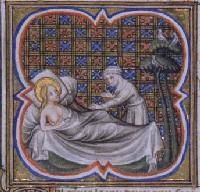 Known as Szent Erzsébet in her native Hungary, Elizabeth (Erzsebet, Elisabeth) was born in Sárospatak in 1207, the daughter of King Andrew II and his wife Gertrude. When only four years old, she was betrothed by parental arrangement to Ludwig (Louis), son of Hermann I, Landgrave of Thuringia, and Duchess Sophia. At this tender age, the child moved to the Thuringian court. She married him in 1220, when just fourteen. He was only twenty and had been ruling as Ludwig IV since 1217.
Known as Szent Erzsébet in her native Hungary, Elizabeth (Erzsebet, Elisabeth) was born in Sárospatak in 1207, the daughter of King Andrew II and his wife Gertrude. When only four years old, she was betrothed by parental arrangement to Ludwig (Louis), son of Hermann I, Landgrave of Thuringia, and Duchess Sophia. At this tender age, the child moved to the Thuringian court. She married him in 1220, when just fourteen. He was only twenty and had been ruling as Ludwig IV since 1217.Her spirit of Christian generosity and charity pervaded the home she established for her husband and three children in the Wartburg Castle at Eisenach. Their abode was known for hospitality and family love.
Elizabeth often supervised the care of the sick and needy, even giving up her bed to a leper at one time. Unlike many medieval men, particularly the rulers, Louis encouraged her efforts and contributed directly to them. This seems due, in large part, to a faith that depended much upon works in order to avoid Purgatory.
When she was widowed at 20, circumstances drastically changed. Already possessed of a charitable heart, Elizabeth increased her work on behalf of others — her confessor, the inquisitor Konrad von Marburg, encouraging (or pushing) her growing spiritual discipline. Some accounts say that Konrad not only enforced his will through a strong personality but that he also resorted to beatings and separating her from her children.
Later, she arranged for her children's well-being and entered into life as a nun in the Order of Saint Francis. Her self-denial, quite possibly abetted by harsh treatment at the hands of her confessor, led to failing health and an early death in 1231 at age 24. Remembered for her self-sacrificing ways, Elizabeth is commemorated through the many hospitals named for her around the world.
Note: For Lutherans, Wartburg Castle holds special significance because of events happening some three hundred years later. It was to the Wartburg that friends moved Martin Luther in 1521 to escape enforcement of the imperial ban and possible death. Hiding under the name Junker Jörg (Knight George), Luther employed himself by continuing his doctrinal and polemical writing and translating the New Testament.
Lection
Psalm 146:4-9 or 112:1-9
Tobit 12:6b-9
Matthew 25:31-40 or Luke 12:32-34
Collect
Almighty God, by whose grace your servant Elizabeth of Hungary recognized and honored Jesus in the poor of this world, grant that we, following her example, may with love and gladness serve those in any need or trouble, in the name and for the sake of through Jesus Christ our Lord, who lives and reigns with you and the Holy Spirit, one God, now and forever.
Technorati Tags: Elizabeth of Hungary | Saint Elizabeth of Hungary | St. Elizabeth of Hungary | Szent Erzsébet | Erzebet | Elisabeth | Ludwig IV of Thuringia | Louis IV of Thuringia | Konrad von Marburg | Conrad of Marburg | Hungary | Germany | Sárospatak | arospatak | Thuringia | Eisenach | Wartburg Castle | charity | healing | hospitals | Church Year | liturgical calendar | sanctorial calendar | Christianity | Christian | Lutheran | Lutheranism | Christian feasts | festivals | saints' days | biography | hagiography | commemoration | theology | historical theology | history | Church history | Christian history | European history | German history | Hungarian history | Thuringian history | Medieval history
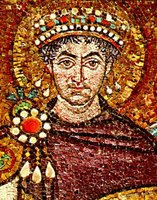 Justinian, Christian Ruler and Confessor of Christ, was emperor of the East from A.D. 527 to 565, during the time of decline of the Roman Empire. Aided by his beautiful and capable wife, Theodora, he restored majesty to the Byzantine court and is considered by historians to be the last true "Roman" emperor. During his reign the Empire experienced a renaissance, due in large part to his ambition, intelligence, and strong religious convictions.
Justinian, Christian Ruler and Confessor of Christ, was emperor of the East from A.D. 527 to 565, during the time of decline of the Roman Empire. Aided by his beautiful and capable wife, Theodora, he restored majesty to the Byzantine court and is considered by historians to be the last true "Roman" emperor. During his reign the Empire experienced a renaissance, due in large part to his ambition, intelligence, and strong religious convictions.His beginnings rival most any tale of rags to riches. Born into a peasant family, he was adopted by his uncle Justin, his mother's brother. Justin went from being a member of the imperial guard to Emperor and even, before reaching this pinnacle of power, was in a position to provide the best education possible for his nephew cum son. Justinian partially repaid his uncle's kindness by supporting Justin's selection as emperor.
Perhaps due in part to his own family's peasant members, Justin decreed that differences in social class were no longer barriers to marriage. Some time later, Justinian found a woman to claim as his bride. Since Justin had removed class barriers, Justinian made full advantage of the changes by taking Theodora as his wife. Here was a truly disparate set of individuals: While the emperor in waiting had ascended from peasant stock to ruling class, his bride came from a background considered lower than peasant — perhaps even lower than slave, for she was an actress and a courtesan.
Despite such unsavory beginnings, Theodora proved herself a worthy companion for the Emperor. Throughout her life she was Justinian's staunchest supporter and one of his most trusted advisers. Many historians believe that without her intellect and decisiveness, Justinian might have been deposed and the empire torn apart in the Nika riots.
Although he was responsible for a considerable number of civil and military accomplishments, Christians chose to remember Justinian for his religious contributions. He was a champion of orthodox Christianity. From this confessional position, he attempted to unite a sharply divided Church, seeking agreement among the parties in the Christological controversies of the day. He was particularly eager to bridge the gap between Chalcedonian Christians and the Monophysites. These parties disputed the relationship between the divine and human natures in the Person of Christ. His special interest likely because a large number of Monophysite Christians lived within the empire — including, at least in her younger years, his own wife. The Fifth Ecumenical Council in Constantinople in AD 533 addressed these disagreements but a full solution never presented itself.
 Both Justianian and Theodora accomplished much. However, as with many other renowned champions of the faith, the emperor sometimes exhibited less than exemplary behavior. He often fostered overzealous attempts to forward or defend Christianity by fiat or force of arms. The list of those he suppressed, condemned, and sometimes killed is considerable. He set Athens' Neoplatonic Academy under state control, ending its teaching of unchristian Hellenistic philosophy. He suppressed Paganism. He halted the worship of Amun at Augila in the Libyan desert and that of Isis on the island of Philae.
Both Justianian and Theodora accomplished much. However, as with many other renowned champions of the faith, the emperor sometimes exhibited less than exemplary behavior. He often fostered overzealous attempts to forward or defend Christianity by fiat or force of arms. The list of those he suppressed, condemned, and sometimes killed is considerable. He set Athens' Neoplatonic Academy under state control, ending its teaching of unchristian Hellenistic philosophy. He suppressed Paganism. He halted the worship of Amun at Augila in the Libyan desert and that of Isis on the island of Philae.Justinian's government restricted the civil rights of Jews and the emperor actively interfered with the synagogues, going so far as to forbid the use of the Hebrew language in worship. Resistance might be met with corporal penalties, exile, and property confiscation. The empire likewise persecuted the Manicheans. They, too, faced punishment and threats including exile and capital punishment. The incident that probably leaves the darkest stain on his reputation occurred at Constantinople. There, after severe questioning, a number of Manicheans were executed in his presence. Some were burned, others drowned.
The other side of his enthusiasm for God's Word and orthodox Christianity exhibited itself in his missionary zeal. Missionary ventures that Justinian sponsored helped to lead thousands in Africa and Asia Minor to the Christian Faith. For example, John of Ephesus claimed to be involved the the conversion of some 70,000 pagans in Asia Minor. Others led to Christianity included Huns dwelling near the Don, the Abasgi, the Heruli, and the Tzani of Caucasia. A mission to the Nabataeans was led by Julian the Presbyter and the Bishop Longinus. Justinian also tried to strengthen Christianity in Yemen by sending a bishop from Egypt to that region.
Theodora, born about twenty after her husband, died about twenty years before he did. Meanwhile, Justinian died in his eighties, without seeing the completion of his desire for a solidly orthodox Christian empire. Due to his ongoing championing of the faith, the Eastern Church counts him as a saint, as it also does Theodora.
Technorati Tags: Justinian | Emperor Justinian | Justin | Emperor Justin | Theodora | Roman Empire | Byzantium | Istanbul | Constantinople | Byzantine | Fifth Ecumenical Council | Lutheran | Lutheranism | Christianity | Christian | Chalcedonian Christianity | orthodox Christianity | Monophysite | Monophysitism | heresy | theology | Christology | systematic theology | apologetics | dogmatics | Church history | historical theology | hagiography | biography | Church Year | liturgical calendar | commemorations | lectionary | Roman history | Greek history | Byzantine history | Turkish history | Near Eastern history | European history
In parts of the world, including these United States, 11 November is a day of remembrance growing out of the end of World War I. It grew from the armistice ending western European hostilities in the First World War. This post's subtitle comes from the implementation of the armistice at the eleventh hour of the eleventh day of the eleventh month — that is, at 11:00 a.m. GMT on 11 November 1918.
Originally known as Armistice Day (and still called this by some) the United States expanded the emphasis from gratitude for the end of the "War to End All Wars" to remembering and thanking all of our honorably discharged military personnel. The US holiday was officially established as Veterans Day in 1954.
Spiritually, the "Great War" of the early 1900s ended much positive thinking about the upward climb of mankind and helped usher in the era of Modernism. The harshness of the "peace" which followed led to renewed hatred and hostilities in Europe. Coupled with the Great Depression, this helped to begin events leading to the Second World War.
The false hope much of the world, including many Christians, held for a utopian earth with no more armed conflict perished on the battlefields of these two world conflicts along with thousands upon thousands of armed combatants and millions of civilians. Wars and rumors of wars continue to testify against this fallen Creation and point to the final end of conflict, when our Savior returns in judgment.
We will still remember those who served honorably to defend the ideals upon which our Republic was founded. We will also continue to pray that America would return to much she has forgotten about both individual freedom and the interdependence of all citizens in a free society.
Technorati Tags: Veterans' Day | Armistice Day | First World War | World War One | World War I | world history | holidays | American history | United States history | military service | church and state
Martin of Tours, pastor and bishop of the Church, was born into a pagan family in what is now Hungary around the year AD 316. He grew up in Lombardy (a region in Italy) and came to the Christian faith as a young man. He then began a career in the Roman army. But sensing a call to a church vocation, Martin left the military and became a monk, affirming that he was "Christ's soldier."
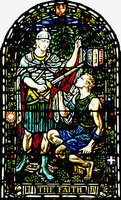 According to early stories, the change came about when Martin was about 21 years old. It was said that he passed the gates of Amiens and saw a man freezing on the side of the road. Taking pity on him, Martin ripped his army issue cloak in half and gave it to the man to help comfort him. That night, Martin dreamt of Jesus Christ wearing that half cloak. This vision shook Martin to the core. No longer wanting to be part of the army, he succeeded in attaining a discharge from service.
According to early stories, the change came about when Martin was about 21 years old. It was said that he passed the gates of Amiens and saw a man freezing on the side of the road. Taking pity on him, Martin ripped his army issue cloak in half and gave it to the man to help comfort him. That night, Martin dreamt of Jesus Christ wearing that half cloak. This vision shook Martin to the core. No longer wanting to be part of the army, he succeeded in attaining a discharge from service.Martin journeyed to the city of Poitiers where he met Bishop Hilary. As was not uncommon at the time, even though Martin already considered himself a Christian, he was not yet baptized. Therefore, Hilary administered the sacrament before Martin left Poitiers.
Returning to Gaul, Martin found that the Arian heresy had taken a firm hold. He spoke out against it and was singled out for persecution and forced to flee. The same happened shortly thereafter to Saint Hilary. Martin fled to an island in the Tyrrhenian Sea, living as a hermit. In 361, Martin discovered that Hilary had regained his seat in Pontiers; this news moved Martin to return to Gaul.
Hilary sent Martin to Leguge, a Benedictine monastery, to continue his ways as a hermit; there Martin spent the next ten years. In 371, the Bishop of Tours died and Martin was asked twice to assume that seat — he respectfully refused both times. Martin was tricked into coming to Tours to administer the Anointing of the Sick to a friend's wife. This time Martin was persuaded to accept the responsibility as Bishop of Tours. We remember him for his simple lifestyle and his determination to share the Gospel throughout rural Gaul, as well as his work as bishop in successfully staving off numerous heresies.
Hilary was named as a Doctor of the Church by Pope Pius IX in 1851. However, both he and Martin were already acclaimed as saints by general consensus before any official system of canonization was established.
Over a millennium later, on St. Martin's Day 1483, the one-day-old son of Hans and Margarette Luther was baptized and given the name Martin. Coincidentally, much of the world commemorates the armistice ending World War I and honors veterans on 11 November. Thus we also note that St. Martin is a traditional patron saint of soldiers.
Lection
Psalm 15 or 34:15-22
Isaiah 58:6-12
Matthew 25:34-40
Collect
Lord God of hosts, You clothed Your servant Martin the soldier with the spirit of sacrifice and set him as a bishop in Your Church to be a defender of the orthodox, catholic, and apostolic faith. Give us grace to follow in his holy steps, that at the last we may be found clothed with righteousness in the dwellings of peace; through Jesus Christ our Lord, who lives and reigns with You and the Holy Spirit, one God now and forever.
Technorati Tags: Martin of Tours | Saint Martin of Tours | St. Martin of Tours | Hilary of Poitiers | Poitiers | Tours | Martin Luther | patron saint | soldiers | Lutheran | Lutheranism | Roman Catholicism | Catholicism | Christianity | Christian | orthodox Christianity | Arianism | heresy | theology | systematic theology | dogmatics | Church history | historical theology | hagiography | biography | Church Year | liturgical calendar | commemorations | lectionary | Roman history | French history | European history
 After celebrating the birth of the Second Martin, we immediately turn to the natal anniversary of of the original Martin. Yes, on this date in 1483, a baby boy was born in the Saxon town of Eisleben to Hans and Margarette Luther. On the morrow, they would have the child baptized and given the name of that day's saint, Martin of Tours.
After celebrating the birth of the Second Martin, we immediately turn to the natal anniversary of of the original Martin. Yes, on this date in 1483, a baby boy was born in the Saxon town of Eisleben to Hans and Margarette Luther. On the morrow, they would have the child baptized and given the name of that day's saint, Martin of Tours.The rest, as they say, was history, of which you can read a bit more at the commemoration of his death.
If you celebrate the day with (German chocolate) cake and candles, I suggest baking a couple extra in order to hold all the lights. Then leave a window open so as not to deplete the oxygen supply. Finally, you might also want to contact the local fire marshal.
Technorati Tags: Martin Luther | Hans Luther | Margarette Luther | Martin Chemnitz | Lutheran Reformation | Lutheran | Christian | happy birthday | birthday | church history | Saxon history | Lutheran history | German history
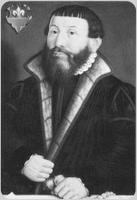 Today marks the birthday of Martin Chemnitz, Pastor and Confessor. We regard him as, after Martin Luther, the Lutheran Church's most important theologian. He possessed a penetrating intellect and an almost encyclopedic knowledge of Scripture and the Church Fathers combined with a genuine love for the Church.
Today marks the birthday of Martin Chemnitz, Pastor and Confessor. We regard him as, after Martin Luther, the Lutheran Church's most important theologian. He possessed a penetrating intellect and an almost encyclopedic knowledge of Scripture and the Church Fathers combined with a genuine love for the Church.Doctrinal quarrels after Luther's death in 1546 led Chemnitz to give himself fully to the restoration of unity in the Lutheran Church. He became the leading spirit and a principal author of the 1577 Formula of Concord, which settled the doctrinal disputes on the basis of the Scriptures and largely succeeded in restoring unity among Lutherans. Work on the Formula led Chemnitz and others to gather all the normative doctrinal statements confessed by the Lutherans, from the ancient creeds through the Evangelical writings of the 16th Century, into one volume, the Book of Concord.
Chemnitz also authored the four volume Examination of the Council of Trent (1565-1573). This monumental work saw him rigorously subjecting the pronouncements of this Roman Catholic Council to judgment by Scripture and the Church Fathers. The Examination is the definitive Lutheran answer to the Concilium Tridentinum and an outstanding exposition of the faith of the Augsburg Confession.
While he was an outstanding academic, Chemnitz also ably served in church administration. He joined the Wittenberg University faculty in January 1554 and was ordained into the Office of the Holy Ministry by Johannes Bugenhagen in November of that same year. Then, after serving for several years as co-adjutor of the churches in the region of Brunswick-Wolfenbüttel, he became Superintendent (ecclesiastical supervisor), holding the post until his death. In this capacity, he worked diligently to balance the congregations' autonomy, particularly in calling pastors, with input and oversight by the the area ministerium.
As theologian and a churchman, "the Second Martin" was truly a gift of God to the Church. This is why the expression was coined, Si Martinus non fuisset, Martinus vix stetisset. ("If Martin [Chemnitz] had not come along, Martin [Luther] would hardly have survived.")
Technorati Tags: Martin Chemnitz | Martin Luther | Johannes Bugenhagen | Formula of Concord | Book of Concord | Concordia | Council of Trent | Examination of the Council of Trent | Wittenberg | University of Wittenberg | Brunswick Wolfenbüttel | Lutheran | Lutheranism | Roman Catholicism | Catholicism | Christianity | Christian | Reformation | Lutheran Reformation | systematic theology | dogmatics | Church history | Lutheran history | historical theology | hagiography | biography | Church Year | liturgical calendar | commemorations | lectionary | German history | European history
 Today we remember Johannes von Staupitz, vicar-general of the Augustinian Order in Germany. He befriended the spiritually troubled Martin Luther on numerous occasions, serving as father confessor for the young monk and sending Luther deeper into the Scriptures while attempting to calm his troubled conscience.
Today we remember Johannes von Staupitz, vicar-general of the Augustinian Order in Germany. He befriended the spiritually troubled Martin Luther on numerous occasions, serving as father confessor for the young monk and sending Luther deeper into the Scriptures while attempting to calm his troubled conscience.Staupitz was born in Saxony, studied at the universities in Leipzig and Cologne, and served on the faculty at Cologne. In 1503 Frederick the Wise called him to serve as dean of the theological faculty at the newly founded University of Wittenberg. There, Staupitz encouraged Luther to attain a doctorate in theology and appointed him as his successor to professor of Bible.
During Luther's early struggles to understand God's grace, it was Staupitz who counseled Luther to focus on Christ and not on himself. In later years, Luther said, "If it had not been for Dr. Staupitz, I should have sunk in hell."
Staupitz died on 28 December 1524 but the LCMS commemoration was moved away from the Nativity season and linked to this time in November immediately preceding the birthdays of reformers Martin Chemnitz and Martin Luther.
Technorati Tags: Johannes von Staupitz | Johann von Staupitz | Johannes Staupitz | Johann Staupitz | Martin Luther | Frederick III | Frederick the Wise | Lutheran Reformation | Lutheran | Christian | Wittenberg | University of Wittenberg | Gospel | Augustinian Order | Lutheran | Lutheranism | Roman Catholicism | Catholicism | Christianity | Reformation | Lutheran Reformation | Electoral Saxony | Saxony | Church history | historical theology | hagiography | biography | Church Year | liturgical calendar | commemorations | lectionary | German history | Saxon history | European history
 Also known as All Souls' Day, this commemoration goes hand in glove with yesterday's remembrance of All Saints' Day. In the early Church, feasts of apostles and evangelists were soon celebrated, especially those of Peter and Paul, although John and James were also early favorites.
Also known as All Souls' Day, this commemoration goes hand in glove with yesterday's remembrance of All Saints' Day. In the early Church, feasts of apostles and evangelists were soon celebrated, especially those of Peter and Paul, although John and James were also early favorites.Later, martyrs and many other canonized saints were commemorated on 1 November (All Saints' Day). The departed in Purgatory were remembered on 2 November (or the 3rd, if the 2nd fell on Sunday).
Although the unbiblical idea of purgatory was rooted out of the Lutheran Church, our forefathers saw much good in a day set aside to remember those who departed in the Faith and who await the resurrection of all flesh. Many who grew up in the German language remember Totenfest, the Feast of the Dead or Festival for the Dead. Fredrick William III instituted it in 1816 to honor Prussian dead from the Napoleonic wars. When Fredrick Wilhelm imposed the Prussian Union in 1817, the celebration was incorporated into Prussia's new Evangelical Church. In most places, it was celebrated on the last Sunday of the Church Year while a few held the commemoration on 31 December.
In parts of Latin America, particularly Mexico, All Saints' and, especially, All Souls' Day morphed somewhat into the Day(s) of the Dead (Dia de los Muertos). In many places, this has become a largely secular festival with religious (and often superstitious) overtones. It especially remembers departed family members as well as friends and even beloved pets with special altars and much feasting.
Lection
Psalm 34:1-9
Isaiah 35:3-10
2 Peter 3:8-14
John 5:24-29
Collect
Almighty God, in whose glorious presence live all who depart in the Lord and before whom all the souls of the faithful who are delivered of the burden of the flesh are in joy and felicity, we give You hearty thanks for Your loving-kindness to all Your servants who have finished their course in faith and now rest from their labors, and we humbly implore Your mercy that we, together with all who have departed in the saving Faith, may have our perfect consummation and bliss, in both body and soul, in Your eternal and everlasting glory; through Jesus Christ, our Lord, who lives and reigns with You and the Holy Spirit, one God, now and forever.
See the Christian Cyclopedia for more information.
Technorati Tags: Commemoration of the Faithful Departed | The Faithful Departed | All Souls' Day | Totenfest | Dia de los Muertos | Day of the Dead | All Saints' Day | purgatory | heaven | eternal life | Prussia | Prussian Union | Fredrick Wilhelm III | Church Year | liturgical calendar | Christianity | Christian | Lutheranism | Lutheran | feasts | festivals | saints' days | biography | hagiography | commemorations | lectionary | theology | practical theology | historical theology | Church history | Christian history | Prussian history | German history
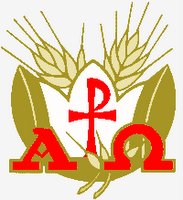 The first day of November (or a Sunday close to it) is traditionally observed as All Saints' Day. On this day the Church — particularly Western Christendom — remembers those who have finished the course of this life in faith and are now at rest with the Lord.
The first day of November (or a Sunday close to it) is traditionally observed as All Saints' Day. On this day the Church — particularly Western Christendom — remembers those who have finished the course of this life in faith and are now at rest with the Lord.On All Saints' Day, we thank God for the faith of our fellow saints and for their example in the Christian life. But most of all, we praise God for His faithfulness to His saints, keeping them in His merciful favor. God promises to be faithful to us just as He has been faithful to our fellow saints before us.
The day came about in large part because of a glut of canonized saints, including many of the martyrs of the early centuries, in the Roman Catholic Church. So many had been established that the calendar overflowed with saints' days. Therefore, the Church combined many of the "lesser" saints and moved them to the joint commemoration we still celebrate on 1 November.
Lection
Psalm 149
Revelation 7:2-17
1 John 3:1-3
Matthew 5:1-12
Collect
Almighty and everlasting God, You knit together Your faithful people of all times and places into one holy communion, the mystical body of Your Son, Jesus Christ. Grant us so to follow Your blessed saints in all virtuous and godly living that, together with them, we may come to the unspeakable joys You have prepared for those who love You; through Jesus Christ, our Lord, who lives and reigns with You and the Holy Spirit, one God, now and forever.
Technorati Tags: All Saints' Day | Feast of All Saints | saints | martyrdom | sainthood | martyrs | heaven | eternal life | Church Year | liturgical calendar | Christianity | Christian | Christian | Lutheranism | Lutheran | feasts | festivals | saints' days | biography | hagiography | commemorations | lectionary | theology | practical theology | historical theology | Church history | Christian history


